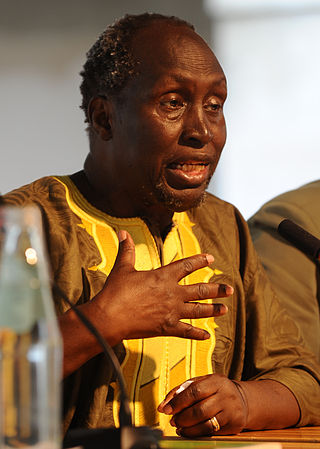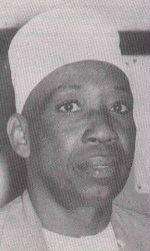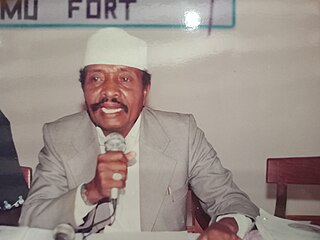
Swahili, also known by its local name Kiswahili, is a Bantu language originally spoken by the Swahili people, who are found primarily in Tanzania, Kenya, and Mozambique. Estimates of the number of Swahili speakers, including both native and second-language speakers, vary widely. They generally range from 60 million to 150 million; with most of its native speakers residing in Tanzania.

Ngũgĩ wa Thiong'o is a Kenyan author and academic, who has been described as "East Africa's leading novelist". He began writing in English, switching to write primarily in Gikuyu. His work includes novels, plays, short stories, and essays, ranging from literary and social criticism to children's literature. He is the founder and editor of the Gikuyu-language journal Mũtĩiri. His short story The Upright Revolution: Or Why Humans Walk Upright has been translated into 100 languages.
Sheng is primarily a Swahili and English-based cant, perhaps a mixed language or creole, originating among the urban youth of Nairobi, Kenya, and influenced by many of the languages spoken there. While primarily a language of urban youths, it has spread across social classes and geographically to neighbouring Tanzania and Uganda.

Shaaban bin Robert, also known as Shaaban Robert, was a Tanzanian poet, author, and essayist who supported the preservation of Tanzanian verse traditions. Robert is celebrated as one of the greatest Tanzanian Swahili thinkers, intellectuals and writers in East Africa and has been called "poet laureate of Swahili" and is also known as the "Father of Swahili." He is also honoured as the national poet.
The Gusii language is a Bantu language spoken in Kisii and Nyamira counties in Nyanza Kenya, whose headquarters is Kisii Town,. It is spoken natively by 2.2 million people, mostly among the Abagusii. Ekegusii has only two dialects: The Rogoro (upper-side) and Maate (lower-side) dialects. Phonologically, they differ in the articulation of /t/. Most of the variations existing between the two dialects are lexical. The two dialects can refer to the same object or thing using different terms. An example of this is the word for cat. While one dialect calls a cat ekemoni, the other calls it ekebusi . Another illustrating example can be found in the word for sandals. While the Rogoro word for sandals is chisiripasi , the Maate dialect word is chitaratara . Many more lexical differences manifest in the language. The Maate dialect is spoken in Tabaka and Bogirango. Most of the other regions use the Rogoro dialect, which is also the standard dialect of Ekegusii.

Mũkoma wa Ngũgĩ is a Kenyan American poet, author, and academic. He is associate professor of literatures in English at Cornell University and co-founder of the Safal-Cornell Kiswahili Prize for African Writing. His father is the author Ngũgĩ wa Thiong'o. His family was deeply impacted by the bloody British suppression of the Mau Mau revolution.
Baraza la Kiswahili la Taifa is a Tanzanian institution responsible with regulating and promoting the Kiswahili language.

Kenyan literature describes literature which comes from Kenya. Kenya has a long literary tradition, both oral and written; primarily in English and Swahili, the two official languages of the country.
Gakaara wa Wanjaũ was a prolific Gĩkũyu author, historian, editor and publisher from Kenya.
Mwananchi Communications Ltd is a company based in Tanzania. Mwananchi Communications Ltd, engages in the print media
The Text Book Centre Jomo Kenyatta Prize for Literature is a biennial literary award given by the Kenya Publishers' Association. It has been called "the most prestigious literary award in the country".
The Kenya Literature Bureau (KLB) is a publishing house and state corporation in Kenya founded in 1947. It is located in South-C off Popo Road in Nairobi.
Jared Angira is a Kenyan poet. He has been called "the country's first truly significant poet".
Henry Chakava was a Kenyan publisher. He focused on the publication of books particularly in East Africa and has been called "the father of Kenyan publishing". For his contribution to educational and cultural literature in his region, he received several awards.
Austin Bukenya is a Ugandan poet, playwright, novelist and academic administrator. He is the author of the novel The People's Bachelor, and a play, The Bride. He has taught languages, literature and drama at Makerere University in Uganda and universities in the UK, Tanzania and Kenya since the late 1960s. He has also held residences at universities in Rwanda and Germany. Bukenya is also a literary critic, novelist, poet and dramatist. An accomplished stage and screen actor, he was for several years Director of the Creative and Performing Arts Centre at Kenyatta University, Nairobi.

Dr. Kimani Njogu is a Kenyan linguist known for his study of and advocacy for the Kiswahili language.
Farouk Mohamedhusein Tharia Topan is the director of the Swahili Centre at the Aga Khan University. He is a specialist in the language and literature of the Swahili people. He has taught at the University of Dar es Salaam, the Institute of Ismaili Studies, and the School of Oriental and African Studies.
The East African Publishing House (EAPH) was a publishing company established in Nairobi in 1965. It was the first indigenous publishing firm in East Africa.

Ahmed Sheikh Nabhany was a Kenyan academic scholar, poet, lexicologist, historian and professor often regarded as the father of modern Swahili poetry. He was the recipient of The Order of the Grand Warrior (O.G.W).






